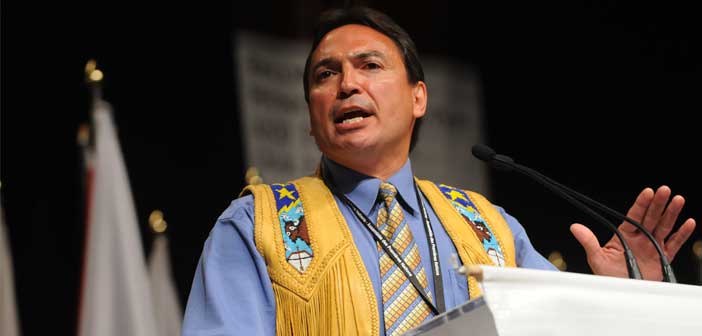WINNIPEG—Perry Bellegarde of Saskatchewan was elected the new grand chief of the Assembly of First Nations (AFN) during a special meeting of the AFN held in Winnipeg on December 10.
National Chief Bellegarde took the contest on the first ballot, securing 63 percent of the 464 ballots cast. There were 639 AFN member chiefs eligible to vote in the election.
The candidates for AFN national chief included Chief Bellegarde, Leon Jourdain, who finished third, and Ghislain Picard, who was acting as interim national chief following the precipitous departure last May of former AFN National Chief Shawn Atleo of British Columbia, who resigned following the tumultuous fallout from the federal government’s proposed overhaul of the act governing First Nations education.
National Chief Bellegarde was a candidate for the top AFN position in 2009, losing out to Chief Atleo following a hard fought eight-ballot contest. He was reelected to the AFN executive in the 2012, a contest that saw Chief Atleo reelected for his second term.
“I think it was a little bit of a slam dunk,” said Anishinaabek Nation (Union of Ontario Indians) Grand Chief Pat Madahbee. “Perry ran before and I think he had a pretty good team in place from when he ran before.”
Chief Madahbee described the election as being somewhat low key and “not as exciting” compared to other AFN leadership contests. “It was conducted in a very respectful manner by all of those involved,” he said, but expressed regret that the number of chiefs coming out to the election was down significantly from previous years. “There were a good 100 chiefs missing,” he said. “I think the numbers (of electors) coming out can be traced, in part, to cutbacks that have been hitting many communities very hard.”
He described National Chief Bellegarde’s speech to the AFN delegates as “strong” and noted that the new grand chief will have his work cut out for him in the coming years.
National Chief Bellegarde’s campaign speech focussed on the need to restructure the AFN and to modernize the organization for the 21st century, a sentiment Chief Madahbee said he supports. “It has been many years since the AFN was formed out of the old National Indian Brotherhood,” he said. “It is time that we looked at modernization.”
Grand Chief Bellegarde ran a campaign that focussed on a pledge to restore pride among First Nations and to focus on self-determination.
In order to bring stability and time for the task ahead, National Chief Bellegarde will have an extra six months added to his three-year term as it seeks to find its relevance in the 21st century.
“To the people across this great land, I say to you, that the values of fairness and tolerance which Canada exports to the world are a lie when it comes to our people,” National Chief Bellegarde said. “Canada will no longer develop pipelines, no longer develop transmission lines or any infrastructure on our lands as business as usual. That is not on,” he cautioned.
In a harbinger of things to come, National Chief Bellegarde pledged opposition to any project that deprives First Nations a share of the profits. “We will no longer accept poverty and hopelessness while resource companies and governments grow fat off our lands and territories and resources,” he said. “If our lands and resources are to be developed, it will be done only with our fair share of the royalties, with our ownership of the resources and jobs for our people. It will be done on our terms and our timeline.”
National Chief Bellegarde’s closing remarks reportedly struck a chord with his audience, reflected in the enthusiastic response his words elicited from the crowd.
“Canada is Indian land,” he said. “This is my truth and this is the truth of our peoples.”
Born in 1962 at the Fort Qu’Appelle Indian Hospital in Fort Qu’Appelle, Saskatchewan, National Chief Bellegarde was raised on the Little Black Bear reserve, attending elementary and secondary schools in the nearby communities of Goodeve and Balcarres. Following high school he attended the Saskatchewan Federated Indian College and later studied business administration at the University of Regina. Following graduation, National Chief Bellegarde was director of personnel for the Saskatchewan Indian Institute of Technologies before joining the Touchwood–File Hills–Qu’Appelle Tribal Council in 1986, where he became president in 1988.
Self-governance issues are a familiar theme to National Chief Bellegarde, who led negotiations to transfer management of the Fort Qu’Appelle Indian Hospital from the federal government to local First Nations and then initiated and implemented the City of Regina’s new urban service delivery centre for First Nations people.
According to the AFN Charter, to be an eligible candidate for the AFN leadership a person must: be 18 years of age or older; be of First Nations ancestry; be a member of First Nation community; in good standing with the AFN; and have 15 eligible electors, First Nations chiefs, endorse his or her candidacy. The AFN charter article 22 states that “the National Chief shall be elected by a majority of sixty (60) percent of the votes.”
The 2014 Election for the Office of AFN National Chief took place December 10 during the AFN Special Chiefs Assembly at the RBC Convention Centre Winnipeg in Winnipeg, Manitoba, December 9 to 11, 2014.



